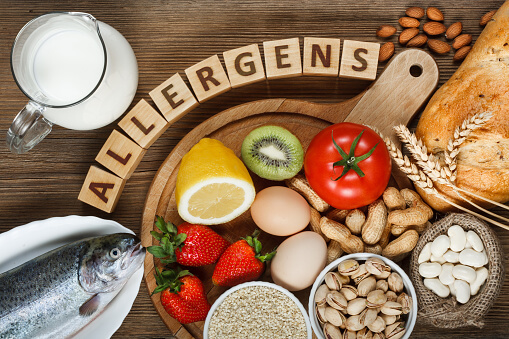Those Food Allergies May Be More Important Than You Think
8 years ago | Nutrition
By Joy Stephenson-Laws, J.D. Founder and Franz Gliederer, MD, MPH
Food allergies can occur at any stage in life. It is reported that as many as 15 million Americans have food allergies. This figure includes nearly 6 million children, under the age of 18.
Foods that generally trigger allergic reactions include fish, walnuts, peanuts, shellfish, wheat and soy.
There are different types of allergies. IgE type allergies occur when the immune system produces antibodies that cause an immediate reaction to a foreign substance that comes from food or inhalation. Examples of immediate reaction include itching, flushes, rashes, throat swelling, watery eyes, runny nose, hoarse voice, abdominal pains, nausea and vomiting. Sometimes this type of allergy can lead to acute life threatening situations such as anaphylaxis or severe breathing problems.
Other delayed type allergies (non-IgE or IgGs) are considered to be food sensitivities. These are much more subtle, and many people live with them for a long time – sometimes many years. It may take hours to several days for the effects of these allergies to show up. They tend to be less severe but can still be bothersome. This type of allergy is associated with vague abdominal complaints, headaches, nausea, depression, fatigue, bloating or just a general feeling of being unwell or malaise.
Most people are unaware that food allergies can cause chronic inflammation in the gut. Food allergies can cause our intestines to experience inflammation and abnormal permeability. This means our guts may be more likely to absorb toxins and less likely to absorb the valuable nutrients from the good food we eat. There may also be negative changes in our immune system. These allergies may also be linked to many other conditions such as chronic eczema, scratchy throat, vague abdominal complaints, autoimmune diseases, asthma, migraine headaches, runny nose and dizziness.
How can we be proactive?
- Lower or avoid our intake of food allergens: When we lower or avoid the intake of foods that are likely to cause allergies, their antibody globulins are likely to decline.
- Pay attention to how your body feels after eating food: Food cravings are frequently desired and sometimes fulfilled in a hurry. But how many times do you actually observe how these foods make you feel after you eat them? Choosing your food wisely based on your personal experience is what you should be striving for. Some of your food cravings can be very treacherous to your health. So develop and strengthen your “good” food cravings, and they may become a habit.
- Get tested: Many people just may not feel well and may have never experienced any other state of health. If you just don’t feel great, perhaps an allergy test might be in order. Allergies can be checked with simple blood tests measuring specific food antibodies such as IgE and IgM (acute reactions) as well as IgG and blocking immunoglobulins IgG4 (which can alleviate allergic reactions).
- Skin testing: This is another frequently used procedure. Small amounts of allergens are pricked into the superficial skin, and these sites are monitored for local reactions such as itching, redness or a bump (wheal). Medical specialists will usually do an exam and take history questions, which may elicit further details on food allergies. An allergist is also valuable to correctly interpret test results.
Once you know what you are truly allergic too, you can eliminate those foods from your diet. This may reduce your body’s reaction to the allergens, and later you can either keep avoiding them or re-introduce them in smaller amounts or with less frequency.
You might even be able to tolerate certain foods again, while others may have to be removed for good.
Finally, you can also check your intestinal reaction to food allergens by doing various gut permeability tests (“checking for leaky gut syndrome”).
Here are some CDC guidelines for children and early care with food allergies. Harvard Health also provides tips for people with food allergies.
Enjoy your healthy life!
The pH professional health care team includes recognized experts from a variety of health care and related disciplines, including physicians, attorneys, nutritionists, nurses and certified fitness instructors. This team also includes the members of the pH Medical Advisory Board, which constantly monitors all pH programs, products and services. To learn more about the pH Medical Advisory Board, click here.







